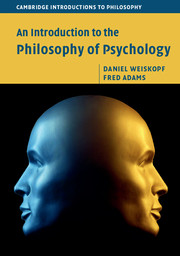My research in the philosophy of cognitive science deals with concepts and mental representation, the links among concepts, language, and perception, embodied and extended cognition, and cross-cultural conceptions of the natural world. Within the philosophy of science I have focused on models and modeling practices, data and technology in cognitive science, scientific kinds, mechanistic explanation, and interfield integration. Links to published papers below are roughly grouped by subject area.
For a sense of what some recent work looks like, here is a talk that I gave at Emory’s Center for the Study of Mind, Brain, and Culture entitled “The Myth of Natural Categories”:
Books

- An Introduction to the Philosophy of Psychology (with Fred Adams) (Bookshop) (Cambridge University Press)
The structure, content, and acquisition of concepts
- The origins of concepts. (2008). Philosophical Studies, 140, 359–384. [Published]
- Atomism, pluralism, and conceptual content. (2009). Philosophy and Phenomenological Research, 79, 130–162. [Published]
- The plurality of concepts. (2009). Synthese, 169, 145–173. [Published]
- Concepts and the modularity of thought. (2010). Dialectica, 64, 107–130. [Published]
- The theoretical indispensability of concepts. (2010). Behavioral and Brain Sciences, 33, 228–229. [Published]
- Remarks on Fodor on having concepts (with William Bechtel). (2004). Mind and Language, 19, 48–56. [Published]
- The Theory theory of concepts. Internet Encyclopedia of Philosophy. (Published online, April 29, 2011) [Published]
- Concepts. (2013). In Byron Kaldis (ed.), The Encyclopedia of Philosophy and the Social Sciences (Vol. 1, pp. 138-144). Thousand Oaks, CA: Sage Publications. [Published]
Relationships among concepts, perception, and language
- Words, images, and concepts. (2015). Analysis Reviews, 75, 99–109. [Published]
- The architecture of higher thought. (2014). In Mark Sprevak and Jesper Kallestrup (eds.), New Waves in Philosophy of Mind (pp. 242–261). New York: Palgrave Macmillan. [Published]
- Observational concepts. (2015). In Eric Margolis and Stephen Laurence (eds.), The Conceptual Mind: New Directions in the Study of Concepts (pp. 223–247). Cambridge, MA: MIT Press. [Published]
- Concept empiricism and the vehicles of thought. (2007). Journal of Consciousness Studies, 14, 156–183. [Published]
- Embodied cognition and linguistic comprehension. (2010). Studies in History and Philosophy of Science, 41, 294–304. [Published]
- Understanding is not simulating: A reply to Gibbs and Perlman. (2010). Studies in History and Philosophy of Science, 309–312. [Published]
- First thoughts. (2008). Philosophical Psychology, 21, 251–268. [Published]
- Compound nominals, context, and compositionality. (2007). Synthese, 156, 161–204. [Published]
Ethno-ontology and ideas of nature across culture
- Representing and coordinating ethnobiological knowledge. (2022). Studies in History and Philosophy of Science Part C: History and Philosophy of Biology and Biomedical Sciences. [Published]
- Anthropic concepts. (2020). Nous. [Published]
- Ethnoontology: Ways of worldmaking across cultures (with David Ludwig). (2019). Philosophy Compass, 14, e12621. [Published]
Modeling, architecture, and explanation in cognitive science
- Trading evidence: The role of models in interfield unification. Philosophy of Science. [Forthcoming]
- Computation as the boundary of the cognitive. (2024). Mind and Language. [Published]
- The predictive turn in neuroscience. (2022). Philosophy of Science. [Published]
- Data mining the brain to decode the mind. (2020). In Fabrizio Calzavarini and Marco Viola (Eds.), Neural Mechanisms: New Challenges in the Philosophy of Neuroscience. Springer. [Published]
- Reductive explanation between psychology and neuroscience. (2018). In Mark Sprevak and Matteo Colombo (eds.), Routledge Handbook of the Computational Mind (pp. 223–236). New York: Routledge. [Published]
- Integrative modeling and the role of neural constraints. (2016). Philosophy of Science, 83, 674–685. [Published]
- The explanatory autonomy of cognitive models. (2018). In David M. Kaplan (ed.), Explanation and Integration in Mind and Brain Science (pp 44–69). Oxford: Oxford University Press. [Published]
- Models and mechanisms in psychological explanation. (2011). Synthese, 183, 313–338. [Published]
- The functional unity of special science kinds. (2011). British Journal for the Philosophy of Science, 62, 233–258. [Published]
- The Goldilocks problem and extended cognition. (2010). Cognitive Systems Research, 11, 313–323. [Published]
- Patrolling the mind’s boundaries. (2008). Erkenntnis, 68, 265–276. [Published]
- The place of time in cognition. (2004). British Journal for the Philosophy of Science, 55, 87–105. [Published]
- A critical review of Jerry A. Fodor, The Mind Doesn’t Work That Way. (2002). Philosophical Psychology, 15, 551–562. [Published]
Mental disorders and vernacular psychology
- An ideal disorder? Autism as a psychiatric kind. (2017). Philosophical Explorations, 20, 175–190. [Published]
- Mental mirroring as the origin of attributions. (2005). Mind and Language, 20, 495–520. [Published]